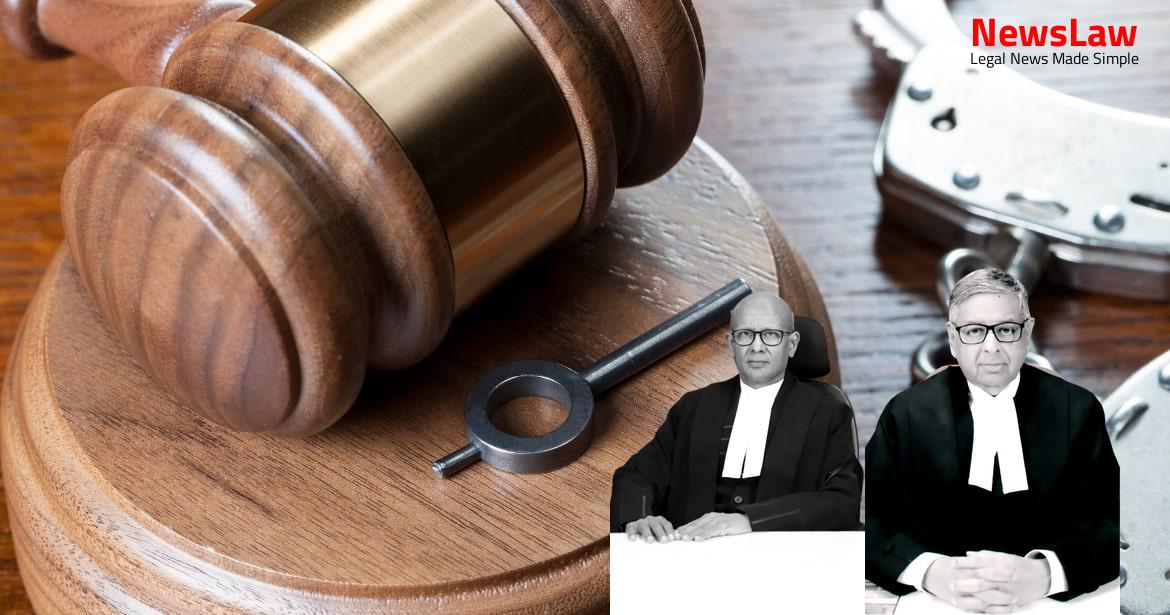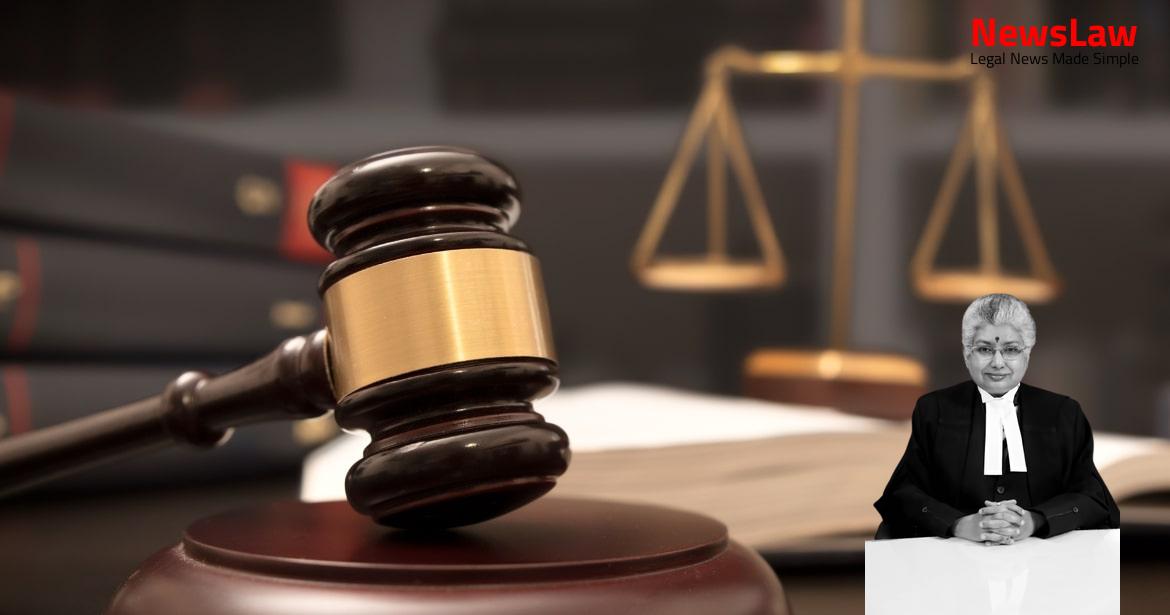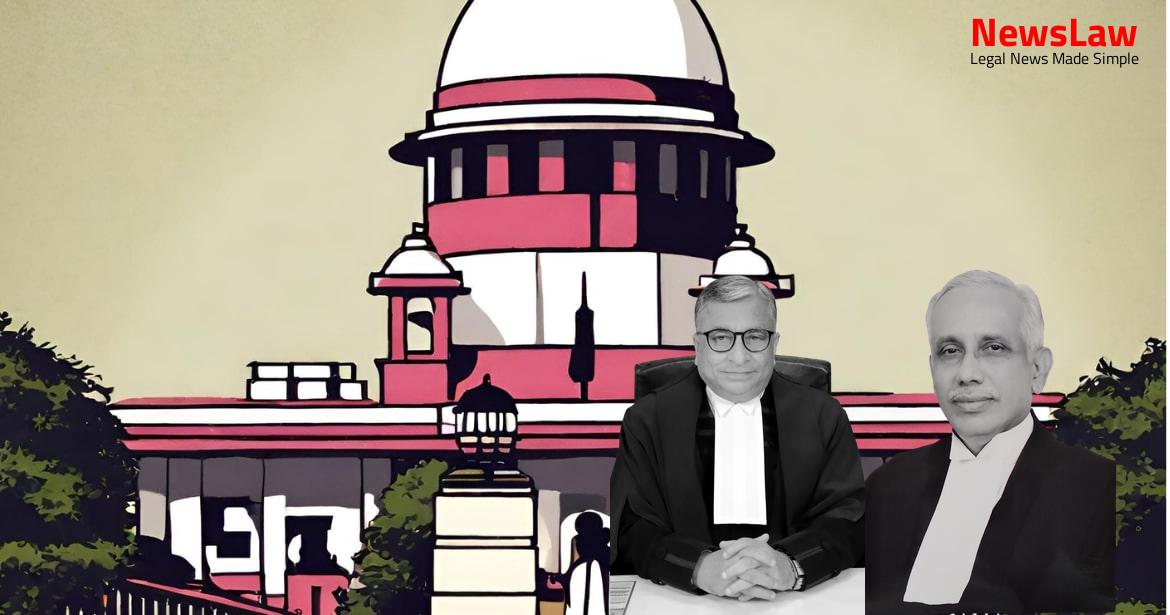The legal dispute between M/S Rajco Steel Enterprises v. Kavita Saraff has garnered attention due to the unique circumstances surrounding the case. Mrs. Kavita Saraff was accused of issuing cheques in discharge of a debt, which she claims were obtained illegally. The High Court’s dismissal of the petitioner’s appeal was based on the lack of valid documentary evidence to substantiate the debt claim. The case delves into the intricacies of cheque fraud and debt disputes in a compelling legal battle.
Facts
- The accused, Mrs. Kavita Saraff, claimed that the cheques in question were not issued by her, but were obtained illegally by the complainant from the investigating agency, CBI.
- Mrs. Kavita Saraff stated that the complainant used her account for stock market transactions to keep it confidential from his family.
- As part of the trading arrangement, the complainant would settle profits and losses using cheques and held some blank signed cheques of Mrs. Kavita Saraff.
- During a CBI investigation, some cheque-books belonging to Mrs. Kavita Saraff were seized.
- Mrs. Kavita Saraff indicated that her non-response to the demand notice was due to her pregnancy, with the child being born on 27.05.2009.
- The petitioner maintained that financial assistance was provided to Mrs. Kavita Saraff, and the disputed cheques were issued as repayment by her.
- A statutory demand notice dated 04.05.2009 was served to Mrs. Kavita Saraff, but she did not comply or respond to it.
- The High Court dismissed the petitioner’s appeal against the judgement of acquittal.
- The High Court found a plausible case made out by the defense regarding the non-existence of a legally enforceable debt.
- No valid documentary evidence could be produced by the complainant and prosecution to substantiate the existence of any enforceable debt or liability on the part of the accused.
- The Trial Court convicted the accused for an offense under Section 138 of the 1881 Act based on the issue of cheques in discharge of a legally enforceable debt.
- The First Appellate Court acquitted the accused, noting the failure of the complainant to produce any document showing a loan transaction, lack of proof of a loan transaction, and failure to prove handing over the cheques by the accused.
- The First Appellate Court also observed discrepancies in the signatures and ink used on the cheques, holding that the presumption of guilt under the relevant sections of the 1881 Act was rebutted by the accused.
Also Read: Chandu v. Sankaran: Legal Battle Over Property Rights
Issue
- The main issue in this case is whether the cheques were issued as a discharge of a debt.
- It needs to be determined if the accused (use Kavita Saraff) was able to rebut the presumption under Section 118 and Section 139 of the 1881 Act.
- The focus is on establishing whether the cheques were issued in fulfillment of a debt obligation.
Also Read: Laxmanrao vs. Vitthalrao Legal Case
Arguments
- Mr. Raju Ramchandran, learned Senior Counsel argued on behalf of the complainant/petitioner that all elements of Section 138 of the 1881 Act were satisfied.
- The signature of the accused and the receipt of money in her bank account were undisputed.
- Once the above factors were established, the burden of proof shifted to the accused, according to Mr. Ramchandran.
- Mere denial of the debt’s existence by the accused would not suffice to rebut the presumption of guilt cast upon them.
- Reference was made to the judgment in D.K. Chandel vs. Wockhardt Limited for supporting arguments.
- Production of books of accounts is not strictly necessary in proceedings under the 1881 Act relating to dishonour of cheques once the main ingredients of the offence are proven.
- Several authorities were cited to support these propositions, including Oriental Bank of Commerce vs. Prabodh Kumar Tewari, Kalamani Tex and Another vs. P. Balasubramanian, Shree Daneshwari Traders vs. Sanjay Jain and Another, Uttam Ram vs. Devinder Singh Hudan and Another, Rahul Sudhakar Anantwar vs. Shivkumar Kanhiyalal Shrivastav, and Kishan Rao vs. Shankargouda.
- The issue regarding the cheques being procured from the custody of CBI had not been extensively addressed by the Appellate Courts in the judgment of conviction by the Trial Court.
- The cross-examination of the accused revealed that she had encashed several cheques from the sub-series of the seized cheque-book, weakening part of her defense.
- Presumption under Section 139 read with Section 118 of the 1881 Act was deemed not applicable as per depositions before the Trial Court
- Presumption under the provisions of the 1881 Act can be rebutted effectively
- Citing cases such as Basalingappa vs Mudibasappa, K. Subramani vs K. Damodara Naidu, Reverend Mother Marykutty vs Reni C. Kottaram, and Krishna Janardhan Bhat vs Dattatraya G. Hegde to support the argument
- Jurisdictional facts needed to establish for invoking presumption under the 1881 Act
- Lacuna in complainant’s evidence can undermine the complaint
- Citing John K. Abraham vs Simon C. Abraham for reference
- Facts related to the source of funds and other documentary evidence for advancing money not deemed relevant for rebutting the presumption by the accused
- Citing Rohitbhai Jivanlal Patel vs State of Gujarat on the irrelevance of fund sources
- Defense of the judgment by arguing lack of evidence to show the cheques were issued in discharge of a legally enforceable debt by the complainant
Also Read: Sonai Election Dispute: Karim Uddin Barbhuiya Vs. Aminul Haque Laskar
Analysis
- The First Appellate Court and High Court’s findings were based on evidence and not deemed as no evidence or perverse.
- Kavita Saraff of Respondent No.1 gave a plausible defense for the funds in their account.
- Both appellate courts did not find any enforceable debt or liability in the evidence.
- High Court upheld the acquittal under Section 378 of the 1973 Code after thorough examination of evidence.
- The principles applied by the High Court were from previous authorities in similar cases.
- The petitioner failed to prove that the cheques were advanced for financial assistance or towards a legally enforceable debt.
- The debt claimed by the petitioner did not reflect in their balance-sheet according to the High Court’s findings.
- Other partners of the firm did not testify as prosecution witnesses to confirm the cheque amounts were for financial aid.
- In the case of Narendra Pratap Narain Singh vs. State of U.P., the jurisdiction of the Court under Article 136 of the Constitution of India to interfere with concurrent findings of fact is not in question.
- Interference is acceptable when findings are based on no evidence or are perverse.
- The judgment clarifies the conditions under which the Court can intervene in concurrent findings of fact.
- The findings were not considered perverse or based on no evidence.
- The positions of law reflected in previous authorities were taken into consideration.
- No perversity was found in the High Court’s and First Appellate Court’s findings against the complainant/petitioner.
- No point of law justifies interference in this case.
Decision
- Pending application(s) to be disposed of.
- No order as to costs.
- The petitions are dismissed.
Case Title: M/S RAJCO STEEL ENTERPRISES Vs. KAVITA SARAFF (2024 INSC 288)
Case Number: SLP(Crl) No.-005583 / 2022



